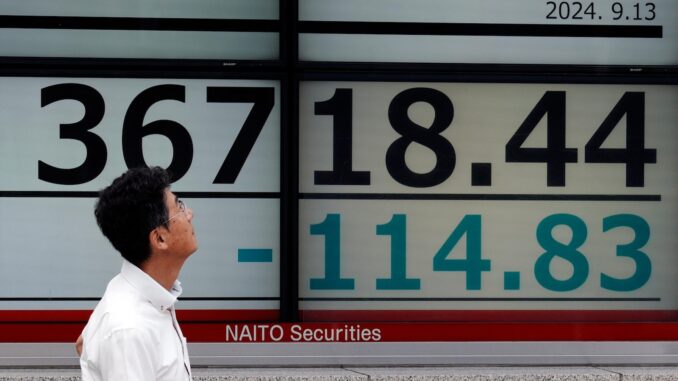
HONG KONG — Asian stocks were mixed Friday after stocks in the United States pulled closer to their records following a couple of economic reports that came in close to expectations.
U.S. futures were little changed and oil prices rose.
Japan’s benchmark Nikkei 225 slipped 0.9% in morning trading to 36,491.80 after a 3.4% increase Thursday.
The Japanese yen strengthened against the greenback, with the USD/JPY falling to 141.05 from 141.79 in Friday’s early trading, adding pressure on the nation’s export trade.
“The Bank of Japan is not expected to make any rate move at its meeting next week, but there may be some hawkish pricing brewing for policymakers to lay the groundwork for further rate hikes in December and beyond,” said IG market analyst Yeap Jun Rong.
Industrial production figures of Japan that reflect the manufacturing demand were set for release later Friday, which could further affect the cost of yen.
Hong Kong’s Hang Seng added 1.1% to 17,422.75, while the Shanghai Composite edged down 0.1% to 2,714.77.
China is set to release its monthly economic data on Saturday, with market predictions that the three key indicators — industrial production, fixed asset investment, and retail sales — will show a slowdown.
Elsewhere, Australia’s S&P/ASX 200 rose 0.3% to 8,096.00. South Korea’s Kospi shed 0.1% to 2,568.41.
On Thursday, the S&P 500 rose 0.7% to 5,595.76, climbing back to within 1.3% of its record set in July following a shaky summer. It’s on track for a fourth winning week in the past five.
The Dow Jones Industrial Average added 0.6% to 41,096.77, and the Nasdaq composite gained 1% to 17,569.68.
Nvidia was the strongest force lifting the S&P 500, rising another 1.9% to bring its gain for the week to nearly 16%. The chip company’s stock has stabilized recently after falling more than 20% during the summer on worries investors had taken it too high in their frenzy around artificial intelligence.
One report said the number of U.S. workers applying for unemployment benefits last week ticked up, though it remains low relative to history. Another said prices charged at the wholesale level were 1.7% higher in August than a year before. That’s a slowdown from July’s inflation rate, but an underlying measure that economists see as a better predictor of future trends also ticked up more than expected.
The inflation data was similar to Wednesday’s report on prices at the U.S. consumer level. It kept traders betting the Fed will deliver a traditional-sized cut of a quarter of a percentage point next week, instead of the larger half-point that some had been expecting.
While lower interest rates help goose the economy and investment prices, they can also give inflation more fuel.
In the bond market, the yield on the 10-year Treasury edged up to 3.68% from 3.66% late Wednesday. It’s steadying a bit after sliding since April on expectations for coming cuts to rates. That easing helped pull the average rate on a 30-year mortgage in the U.S. this week to its lowest level in 19 months, according to Freddie Mac.
In energy trading, benchmark U.S. crude gained 31 cents to $68.28 a barrel. Brent crude, the international standard added 31 cents to $72.28 a barrel.
The euro cost $1.1086, inching up from $1.1074.
___
AP Business Writers Stan Choe contributed from New York.


Be the first to comment